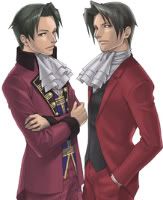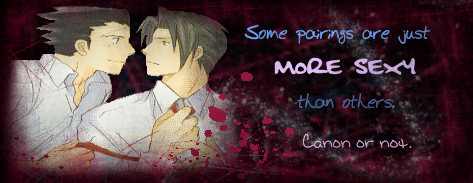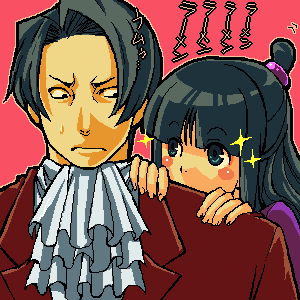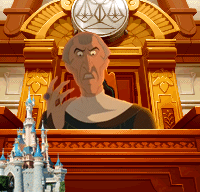Game Music Collector
Gender: None specified
Location: USA
Rank: Suspect
Joined: Wed Oct 29, 2008 3:58 pm
Posts: 6
He has also been a vital contributor to the Ace Attorney orchestral concerts in Tokyo, working on the arrangements which convert each song into the instrumental scores which the members of the orchestra performed.
Noriyuki agreed to answer some questions about the planning of the 2008 orchestral concert and recaps his overall experience working with the Tokyo Philharmonic, turning the music of Ace Attorney into a masterpiece.

Q. At the time of the studio recorded orchestra sessions in 2006, were there any plans for holding a live performance back then?
A. The Phoenix Wright series' founder, Mr. Shu Takumi, and myself had in fact been enthusiastically talking about doing a concert after the studio recording was finished, but I never dreamed it would actually become a reality. Holding a concert requires many factors to properly come together before it can materialize, such as securing the orchestra and an orchestral hall, so thanks goes to the patience and hard work of the Capcom staff. I am extremely grateful that it became a reality.

Q. There seem to be quite a few changes made to the arrangements when comparing the earlier studio-recorded orchestra CD to the live performance in 2008. Were those updates due to some feedback or opinions after the first CD was released, or simply to align the instruments to better utilize the Tokyo Philharmonic's capabilities?
A. There were several reasons for the change in arrangement. Firstly, were unable to use a piano in the concert. This was concerning a problem with the size of the stage, which wasn't very large to begin with. Incidentally, I had requested the orchestra to expand the string and percussion sections, so there wasn't really any space to fit a piano on stage. Therefore, we had no choice but to completely change the songs that incorporated piano.
The formation of the orchestra was also slightly different from the studio recording, so that became a factor as well. In addition, there were a number of songs, such as the courtroom themes, that I condensed into one. When compiling these themes, I placed importance on linking themes together, which required a lot of additional arrangement as well.

Q. The conductor seemed to really get into the music's energy during the concert! Did any of the Tokyo Philharmonic musicians express some comments of their feelings about the music after the show?
A. When the concert was over, we all had separate interviews and various things to do so I wasn't able to speak with the ladies and gentlemen of the orchestra directly. However the conductor, Mr. Kurita, came to me and told me how he would love to do a tour of the concert sometime. During the encore performance in the fall, I had a chance to speak with the ladies and gentlemen of the orchestra and they said they were inspired by the music and that they really enjoyed the performance.

Q. By the way, you really did well conducting on stage and looked very professional. How did you feel when you were on stage as a conductor?
A. Being able to conduct a professional orchestra is a very rare opportunity. It was a fantastic experience that I truly enjoyed. It was, of course, an intense feeling. I'd love to do it again.

Q. The commemorative CD (a special present given out to the audience) contains 2 vocal performances, but during the concert only the female vocalist had performed her Loving Guitar's Serenade song live. During the planning phase, were there any intentions to have the male vocalist there to sing his Steel Samurai's song live during the concert as well?
A. There were no plans to have the Steel Samurai's Theme sung on stage. The inclusion of Tonosaman's Theme on the commemorative album was, itself, something which was decided at the last minute. This commemorative album is very extravagant, and those songs were later included in the fall concert, performed on the Kanadeon.

Q. Can you tell us some details about the unique music-box connected to your keyboard? Is this Kanadeon really a one-of-a-kind custom unit?
A. It's an product co-developed by SRIC Corporation and Sankyo Orgel Corporation called the "Kanadeon," which is a music box that can be physically played through MIDI interface. Currently it is still in development, however I was able to have the development accelerated to meet the time of the concert and actually use it. It is scheduled to go on the market sometime in 2009. It's probably not the first playable orgel in the world. To tell you the truth, I've had the pleasure of being acquainted with the president of SRIC Corporation, Mr. Furiwara, for quite some time now, who played a role in me receiving the opportunity to work on the Phoenix Wright series.
I was surprised when I saw this "Kanadeon" mentioned in my local newspaper and gave Mr. Fujiwara a call. As we were talking, I had a premonition that I could perhaps use this instrument in the concert, so I had him show me a prototype model, and I've been able to give feedback and requests about the instrument such as, "I'd like it to be able to do this." It's currently in the middle of refinement.

Q. Right after you finished this successful orchestral concert for Phoenix Wright, what did you feel and what was in your mind?
A. I had turned down other jobs and had devoted several months specifically to this concert, so when it was over I felt perhaps relieved? It was definitely a weight lifted. I was truly pleased that such a great number of people came to the show and that the staff was satisfied. Even now, I can't forget the smiling faces of the staff when we launched the concert.

Q. Now that your personal dream of a having your compositions performed by a famous orchestra has come true, what do you think your next dream will be?
A. How about a world tour!
Q. Finally, please give any comments for the players of the Ace Attorney series, and for all who love your work!
A. Thank you all for your ongoing support for Ace Attorney! There was a Phoenix Wright theatrical performance in Tokyo by the Takarazuka Revue troupe in early 2009, and the "Gyakuten Kenji" (Miles Edgeworth: Perfect Prosectutor) title will be released soon. I will be handling the music yet again so I hope you're looking forward to it. I myself hope to do more and more challenging music projects so please cheer me on! THANK YOU ALL!
Interviewer: Carl Larson (Moonraiser Media LLC) and Kahori Ezaki (Cocoebiz LLC)
Translator: Justin Pfeiffer
Last edited by Carl on Sun Jun 21, 2009 8:16 pm, edited 1 time in total.
Gender: None specified
Rank: Prosecutor
Joined: Fri Sep 05, 2008 9:18 pm
Posts: 821

Gender: None specified
Rank: Ace Attorney
Joined: Sat Jan 03, 2009 12:20 pm
Posts: 1109
I love all the others composers of AA's music, but it's so nice to actually have him, as he's the one who made all the arrangements CDs, and first and foremost, the orchestra concert with the Tokyo Philharmonic Orchestra !
I really can't wait for GK's soundtrack to be available on P~A (that's... I guess, the 20th time I said that).




1000% Knight
Gender: Male
Rank: Moderators
Joined: Tue Jun 17, 2008 2:06 pm
Posts: 6932
A. How about a world tour!
GWAAAAH! PLEASEPLASEPLEASE!!!!!!
...
It would be good :3

Credit to Evolina for the sig+avatar!
Two more games coming up soon
Gender: Male
Location: Paris
Rank: Prosecutor
Joined: Thu Feb 28, 2008 2:45 pm
Posts: 929
Co-creator of New Year's Turnabout, Turnabout Revolution, and At Dawn's Break
What do you see behind the mask?
Gender: Female
Location: Germany
Rank: Ace Attorney
Joined: Thu Mar 13, 2008 11:09 pm
Posts: 2431
A. How about a world tour!
GWAAAAH! PLEASEPLASEPLEASE!!!!!!
...
It would be good :3
Oh yes, I second that so much!
I'd be thrilled if I could attend a concert here in Germany.
Nice interview, it was a fine read. I've heard a few songs from Kenji so far and I like them a lot.

Do you see the black one...or the white?
Gender: Male
Location: IN SPACE!
Rank: Ace Attorney
Joined: Tue Feb 27, 2007 12:06 pm
Posts: 6664
I feel the same
Gender: None specified
Rank: Prosecutor
Joined: Fri Sep 05, 2008 9:18 pm
Posts: 821

My OTP of OTP's. <3
Gender: Female
Location: Charlotte, NC
Rank: Ace Attorney
Joined: Mon Feb 11, 2008 12:26 am
Posts: 9207
A. How about a world tour!
GWAAAAH! PLEASEPLASEPLEASE!!!!!!
...
It would be good :3
Oh yeah, I would totally go see this. Or if they have another Gyakuten Meets Orchestra event, I may try to go to Japan for it. :3

"Note to Self: Don't get in crouton's way when it comes to Edgeworth. She WILL bite." - PhoenixFire

M + M is love
Gender: Female
Location: i n d o n e s i a
Rank: Medium-in-training
Joined: Sat Jan 10, 2009 2:53 pm
Posts: 593

異議あり! G A Y L A W Y E R S A R E S E X Y !

AAO English community manager
Gender: Male
Location: United Kingdom
Rank: Medium-in-training
Joined: Tue Jul 08, 2008 8:29 pm
Posts: 307
Ooh, a real drumroll. Nice.
Gender: Male
Location: By my computer.
Rank: Prosecutor
Joined: Sun Dec 28, 2008 6:05 pm
Posts: 802
"Go to America next,"
or something along those lines.
I think they were implying that they were going to do another concert somewhere other than Japan

AAO English community manager
Gender: Male
Location: United Kingdom
Rank: Medium-in-training
Joined: Tue Jul 08, 2008 8:29 pm
Posts: 307
"Go to America next,"
or something along those lines.
I think they were implying that they were going to do another concert somewhere other than Japan
Nope. In Japan, Klavier is American (whereas most of the other characters are Japanese).
Who is online
You cannot reply to topics in this forum
You cannot edit your posts in this forum
You cannot delete your posts in this forum
You cannot post attachments in this forum






